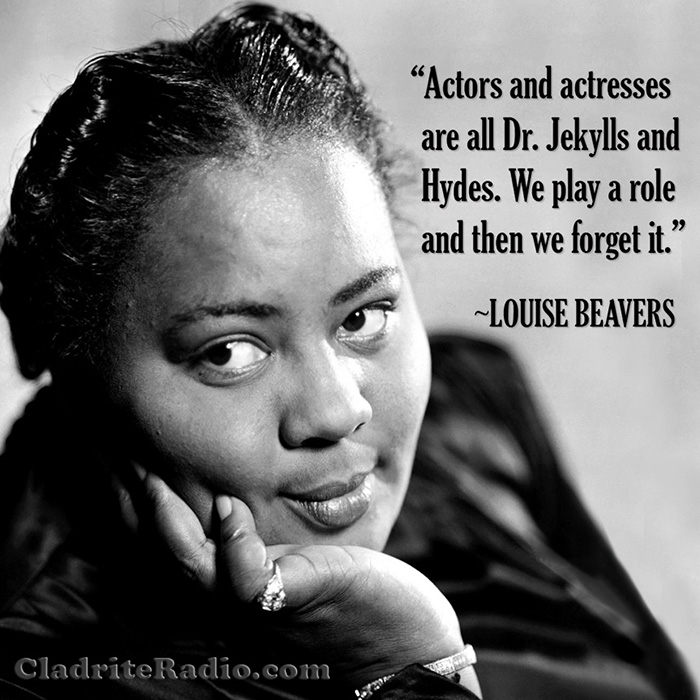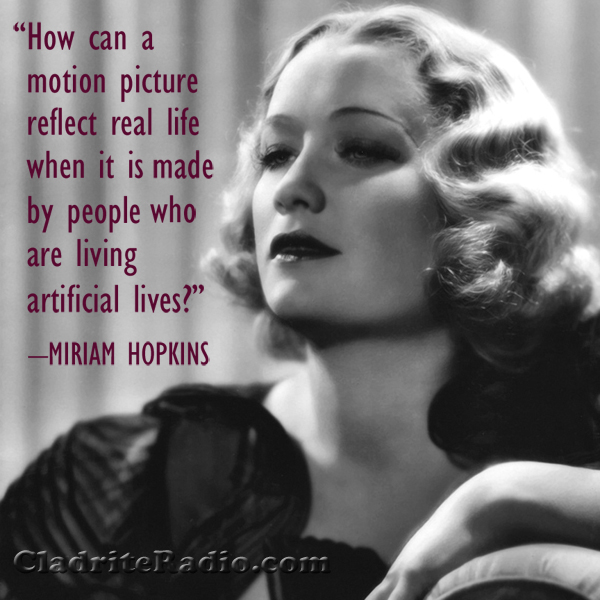The delightful Louise Beavers was born 115 years ago today in Cincinnati, Ohio. Beavers made the very most of the extremely limited opportunities Hollywood offered African American performers in her time, but we can’t help but mourn for what might have been, for Beavers and for so many other black actresses and actors. Here are 10 LB Did-You-Knows:
- Beavers’ father, a school teacher, moved the family to Pasadena, California, when Louise was 11 years ago. While Beavers attended Pasadena High School, her mother, a voice teacher, trained her daughter for the concert stage, but Beavers instead joined an all-female minstrel company called “Lady Minstrels” and spent time in vaudeville. She also worked as a dressing room attendant for a photographer, a nurse, and as a personal maid to silent film star Leatrice Joy.
- A Central Casting Bureau talent scout named Charles Butler saw Beavers perform and urged her to try for a movie role. Beavers was hesitant due to the typically derogatory portrayal of African Americans in pictures at the time, but she was finally persuaded and won a role in Uncle Tom’s Cabin (1927).
- Though Beavers broke into movies near the end of the silent era, she smoothly made the transition into talkies, making more than 75 film appearances by 1935—she appeared in twenty pictures in 1933 alone! Though Beavers’ roles were (sadly) limited to the sort of maid, mammy and slave characters that black actresses were restricted to in those days, she brought a sense of wisdom, warmth and gentleness to them that allowed her to rise above their inherently cardboard, stereotypical nature.
- In 1934, Beavers was given a breakout role in Imitation of Life opposite Claudette Colbert. In that film, she plays Delilah Johnson, a single mother who agrees to serve as a housekeeper for a white widow named Bea Pullman (Colbert) in exchange for room and board for her and her daughter. Delilah and Bea team to open a pancake recipe (using Delilah’s secret recipe) and together become very wealthy, though their respective relationships with their daughters become strained. Beavers was billed fourth for the film, but anyone who’s seen the picture knows that she deserved equal billing with Ms. Colbert, not only for the size and importance of her role but for the memorable and moving performance she delivered.
- After that moment in the spotlight, though, Beavers returned to playing the secondary characters she’d always played, bringing humanity to them but leaving us 21st century movie buffs bemoaning what might have been if had Beavers been allowed to build on her wonderful work in Imitation of Life.
- Beavers was just a year older than Fredi Washington, who played her daughter in Imitation of Life.
- Like other black performers of the day, Beavers sometimes came in for criticism from the African-American community for accepting the kind of derogatory roles Hollywood offered. She defended herself and performers like her, saying, “I am only playing the parts. I don’t live them,” but as she became more successful and better known, she began to speak out more about Hollywood’s poor treatment of black performers.
- Even after finding success in movies, Beavers continued to work in live theatre, taking part in annual tours of twenty weeks’ duration.
- Beavers was the third of three actresses to portray Beulah Brown on the comedic television program The Beulah Show, which began as a radio show before moving to TV. Ethel Waters originated the role on television, followed by Hattie McDaniel, whose health forced her to drop out after just six episodes, at which point Beavers came in as her replacement. The show came in for criticism for its stereotypical characters, but it was the first sitcom to star an African-American performer.
- Among the more than 150 features and shorts in which Beavers appeared are Our Blushing Brides (1930), What Price Hollywood? (1932), 42nd Street (1933), The Story of Temple Drake (1933), Bombshell (1933), Make Way for Tomorrow (1937), Made for Each Other (1939), Mr. Blandings Builds His Dream House (1948) and The Jackie Robinson Story (1950).
Happy birthday, Louise Beavers, wherever you may be!


